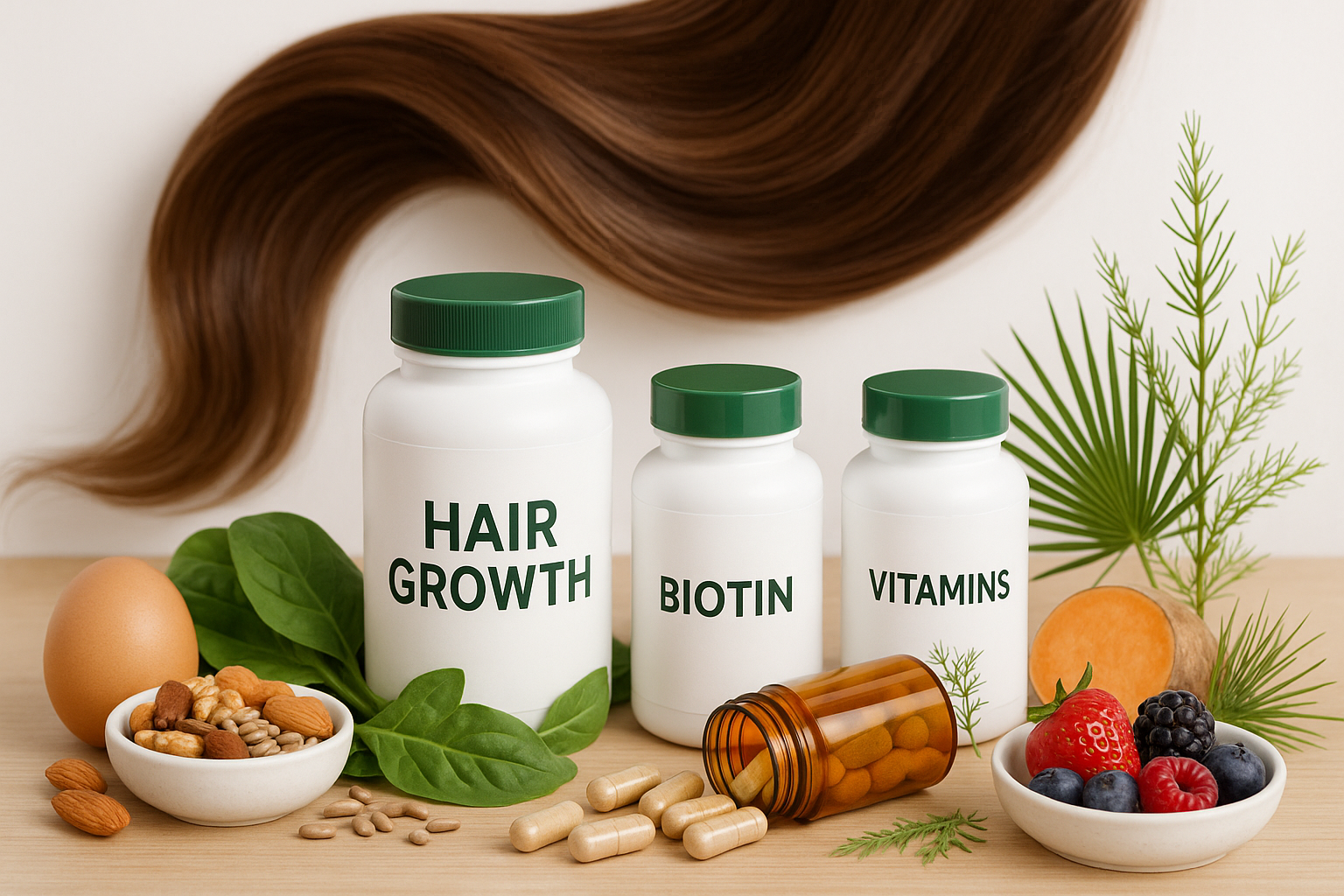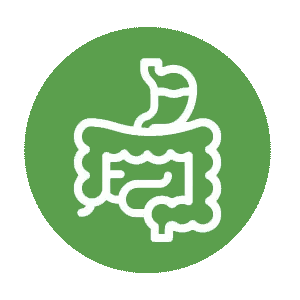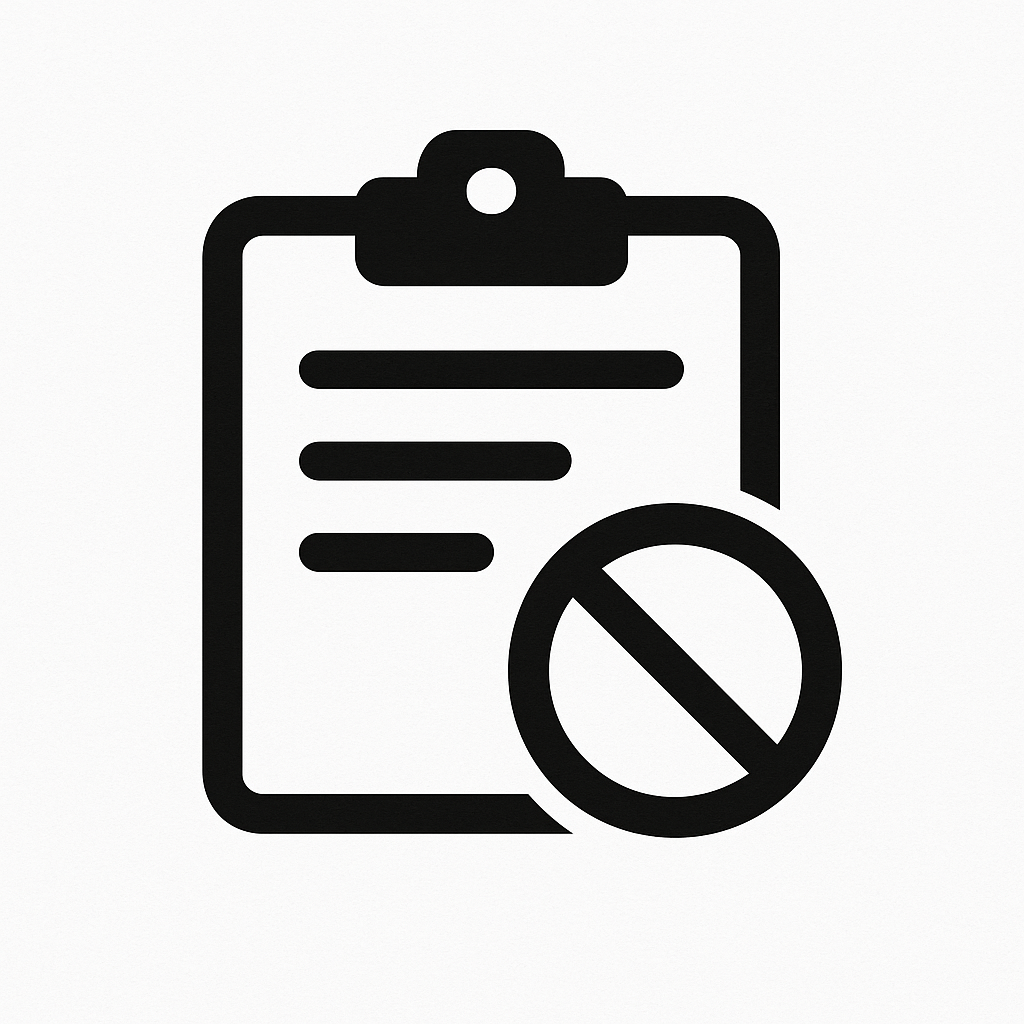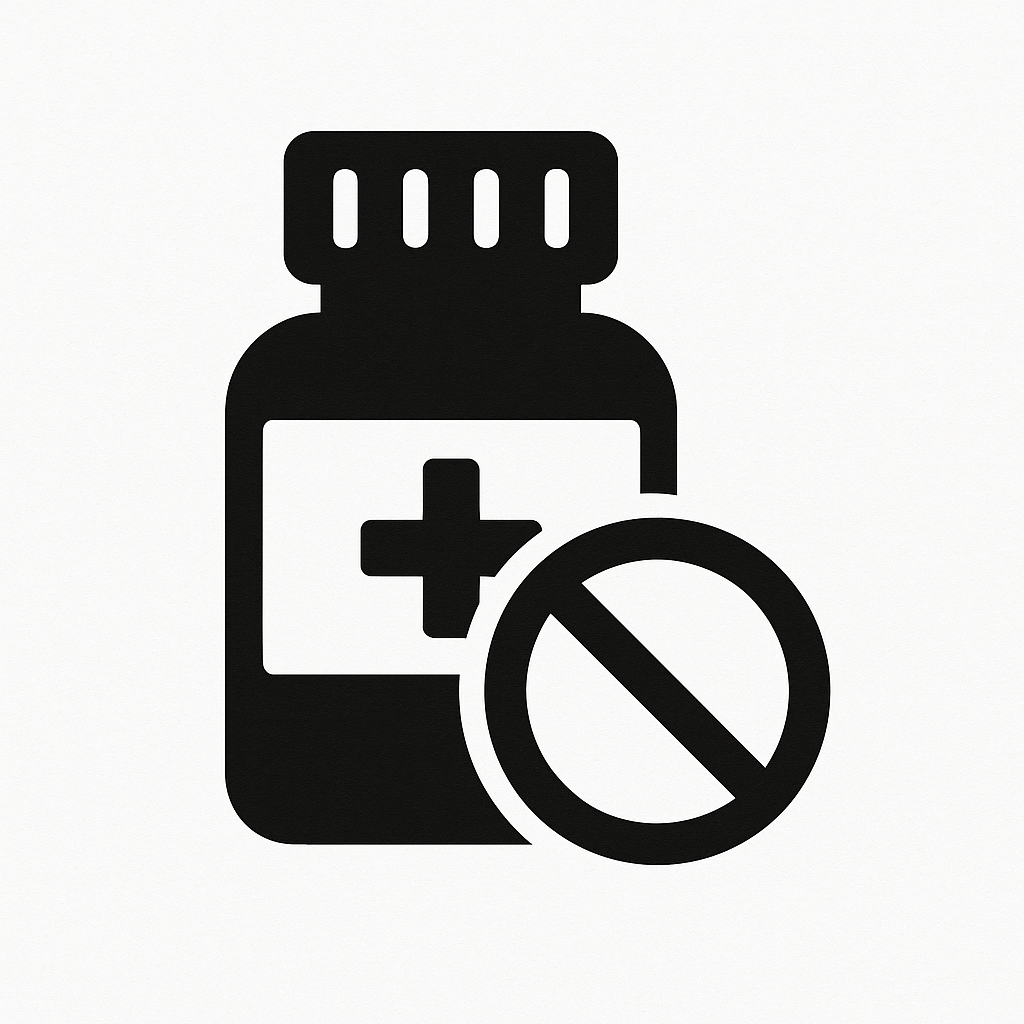
Natural Supplements for Healthy Hair Growth
Understanding Hair Growth From the Inside Out
Walk down any beauty aisle and you'll find countless products promising miraculous hair growth—serums, shampoos, masks, and treatments. Yet the foundation of healthy hair growth isn't built from the outside in, but from the inside out. Your hair follicles are among the most metabolically active tissues in your body, requiring constant nourishment from your bloodstream to produce the approximately 100,000 hairs on your scalp.
Hair growth is a complex biological process influenced by genetics, hormones, age, stress, nutrition, and overall health. While you can't change your genetics, you can significantly impact the nutritional foundation that supports optimal hair follicle function. Each hair strand is made primarily of keratin—a protein requiring specific amino acids, vitamins, minerals, and other nutrients for synthesis.
When nutritional deficiencies exist, your body prioritizes vital organs over non-essential tissues like hair. This is why hair often serves as an early warning system for nutritional inadequacies—thinning, shedding, slow growth, and texture changes frequently signal underlying deficiencies long before more serious health issues develop.
The good news: targeted supplementation can address these deficiencies, support follicle health, extend the growth phase of the hair cycle, reduce excessive shedding, and promote thicker, stronger, more lustrous hair. This comprehensive guide explores the science-backed supplements that genuinely support hair growth, how they work, realistic expectations, and strategies for creating a complete hair health protocol.
Understanding the Hair Growth Cycle
Before diving into supplements, understanding how hair grows helps explain why results take time and why certain nutrients matter:
The Three Phases of Hair Growth
Anagen (Growth Phase): The active growing phase lasting 2-7 years (average 3-5 years). Approximately 85-90% of your hair is in anagen at any time. The length of this phase determines how long your hair can grow. Factors that extend anagen promote longer, fuller hair.
Catagen (Transition Phase): A brief 2-3 week transitional phase where growth stops and the follicle shrinks. About 1-2% of hairs are in catagen.
Telogen (Resting Phase): A 3-4 month resting period before the hair sheds and the follicle begins a new anagen phase. About 10-15% of hairs are in telogen. Excessive stressors can push more hairs into premature telogen (telogen effluvium), causing noticeable shedding 2-3 months later.
Key Insight: Because hair grows slowly (average 0.5 inches per month) and the growth cycle is lengthy, visible improvements from supplementation typically require 3-6 months of consistent use. Any product promising overnight results is misleading.
Ten Science-Backed Supplements for Hair Growth
1. Biotin (Vitamin B7) - The Hair Growth Vitamin
What It Does: Biotin is essential for keratin production—the structural protein forming hair, skin, and nails. It supports amino acid metabolism and cellular energy production within hair follicles.
The Research: While biotin deficiency is rare in developed countries, supplementation shows benefits for hair health. Studies demonstrate that biotin supplementation:
- Improves hair growth in people with underlying biotin deficiency
- Strengthens hair shaft, reducing breakage
- May improve hair thickness and reduce shedding
- Shows particular benefits for brittle hair and nails
A 2015 study found that 38% of women experiencing hair loss had biotin deficiency. Another study showed 90-day biotin supplementation significantly improved hair growth in women with thinning hair.
Dosage: 2,500-5,000mcg daily (often labeled as 2.5-5mg). Higher doses haven't shown additional benefits and may interfere with certain lab tests.
Best For: Women with thinning hair, brittle hair, or confirmed biotin deficiency.
Important Note: Biotin can interfere with thyroid and cardiac lab tests, causing falsely abnormal results. Inform your healthcare provider if you take biotin supplements before blood work.
2. Collagen - The Structural Support
What It Does: Collagen provides amino acids (particularly proline, glycine, and hydroxyproline) essential for keratin production. It may also protect hair follicles from oxidative stress and support scalp skin health.
The Research: While direct studies on collagen and hair growth are limited, research shows:
- Collagen peptide supplementation improves hair thickness and reduces hair loss
- Provides building blocks for hair protein synthesis
- Contains antioxidants that protect follicles from free radical damage
- Supports scalp collagen matrix, strengthening follicle anchoring
One study found that collagen supplementation increased hair diameter by 9% and reduced visible hair loss after 90 days.
Dosage: 10-20 grams of collagen peptides daily, preferably types I and III for hair and skin support.
Best For: Aging individuals experiencing hair thinning, those seeking overall hair strength improvement.
Pro Tip: Combine with vitamin C (which supports collagen synthesis) for enhanced effectiveness.
3. Iron - The Oxygen Transporter
What It Does: Iron is essential for hemoglobin production, which delivers oxygen to tissues including hair follicles. Iron also plays direct roles in DNA synthesis and cell division within rapidly dividing follicle cells.
The Research: Iron deficiency is strongly linked to hair loss, particularly in women. Studies show:
- Low ferritin (iron storage) is found in 72% of women with hair loss
- Iron supplementation significantly improves hair regrowth in iron-deficient women
- Even subclinical deficiency (low ferritin with normal hemoglobin) affects hair growth
- Optimal ferritin levels (>40-50 ng/mL) are associated with better hair growth
Research demonstrates that treating iron deficiency can restore normal hair growth within 3-6 months.
Dosage: 15-30mg elemental iron daily for prevention; 60-120mg for confirmed deficiency (with medical guidance). Choose gentle forms like iron bisglycinate to minimize side effects.
Best For: Women with heavy periods, vegetarians/vegans, confirmed iron deficiency or low ferritin.
Testing: Get ferritin tested before high-dose supplementation to avoid iron overload.
4. Vitamin D - The Follicle Stimulator
What It Does: Vitamin D receptors are present in hair follicles, where vitamin D plays roles in the hair cycle, follicle differentiation, and immune function affecting follicle health.
The Research: Studies show strong correlations between vitamin D deficiency and hair loss:
- Vitamin D deficiency is common in alopecia areata patients
- Low vitamin D levels correlate with telogen effluvium severity
- Vitamin D supplementation may help prevent hair shedding
- Vitamin D influences the anagen (growth) phase duration
One study found that women with low vitamin D had significantly more hair loss than vitamin D-sufficient peers, with improvement after supplementation.
Dosage: 1,000-2,000 IU daily for maintenance; higher doses (5,000 IU) for deficiency correction under medical supervision.
Best For: Individuals with limited sun exposure, darker skin, or confirmed deficiency.
Testing: Check 25-hydroxyvitamin D levels; optimal for hair health is 40-60 ng/mL.
5. Zinc - The Protein Synthesizer
What It Does: Zinc is essential for protein synthesis, cell division, and tissue growth—all critical for hair follicle function. It also regulates hormone levels and reduces inflammation affecting follicles.
The Research: Zinc deficiency causes hair loss, and supplementation benefits those with low levels:
- Zinc supplementation significantly improves hair regrowth in deficient individuals
- Zinc helps regulate the hair growth cycle
- Supports immune function protecting follicles from damage
- May reduce DHT (dihydrotestosterone), a hormone contributing to pattern hair loss
Studies show that people with alopecia areata and telogen effluvium often have low zinc levels that improve with supplementation.
Dosage: 15-30mg elemental zinc daily. Avoid exceeding 40mg long-term without medical supervision (can cause copper deficiency).
Best For: Vegetarians/vegans, people with digestive disorders, those with confirmed deficiency.
Caution: Take zinc with food to prevent nausea. Long-term high doses can interfere with copper and iron absorption.
6. Omega-3 Fatty Acids - The Anti-Inflammatory Support
What It Does: Omega-3s (EPA and DHA) reduce inflammation that can impair follicle function, provide nutrients for hair shaft formation, and support scalp health.
The Research: Studies demonstrate omega-3 benefits for hair:
- Supplementation increases hair density and reduces hair loss
- Provides essential fatty acids for cell membrane structure in follicles
- Reduces inflammatory cytokines that damage follicles
- Supports scalp circulation and nutrient delivery
One six-month study found that omega-3 and omega-6 supplementation significantly increased hair density and reduced telogen (resting phase) hairs.
Dosage: 1,000-2,000mg combined EPA/DHA daily from fish oil, krill oil, or algae oil.
Best For: People with inflammatory conditions, dry scalp, or inadequate dietary omega-3 intake.
Quality Matters: Choose molecularly distilled, third-party tested fish oils to avoid contaminants.
7. Saw Palmetto - The DHT Blocker
What It Does: Saw palmetto may inhibit 5-alpha-reductase, the enzyme converting testosterone to DHT (dihydrotestosterone)—a hormone that shrinks hair follicles in androgenetic alopecia (pattern hair loss).
The Research: Studies on saw palmetto for hair loss show mixed but promising results:
- A 2-year study found 60% of men taking saw palmetto improved in hair growth
- May be beneficial for female pattern hair loss related to androgen sensitivity
- Effects are modest compared to prescription DHT blockers but with fewer side effects
- Best results when combined with other nutrients
Research suggests 200-320mg daily may support hair retention in pattern hair loss.
Dosage: 200-320mg standardized extract (85-95% fatty acids) daily.
Best For: Men and women with androgenetic alopecia (pattern hair loss).
Note: Effects take 4-6 months to become apparent. Not effective for non-hormonal hair loss causes.
8. Vitamin E - The Antioxidant Protector
What It Does: Vitamin E is a potent antioxidant protecting hair follicles from oxidative stress caused by free radicals, UV exposure, and inflammation.
The Research: Evidence supporting vitamin E for hair growth includes:
- 8-month study showed vitamin E supplementation increased hair count by 34.5%
- Protects lipids in cell membranes from oxidative damage
- Improves scalp circulation
- Reduces oxidative stress linked to hair loss
Vitamin E works synergistically with other antioxidants (vitamin C, selenium) for comprehensive protection.
Dosage: 400 IU (268mg) daily of mixed tocopherols (natural form preferred over synthetic).
Best For: Individuals with oxidative stress from smoking, UV exposure, or pollution.
Caution: High doses (above 400 IU) may increase bleeding risk; consult healthcare provider if taking blood thinners.
9. B-Complex Vitamins - The Metabolic Supporters
What It Does: B vitamins (particularly B12, folate, B6, niacin) support red blood cell formation (delivering oxygen to follicles), energy metabolism within follicles, and protein synthesis.
The Research: Multiple B vitamins impact hair health:
- Vitamin B12 deficiency causes hair loss, particularly in vegetarians/vegans
- Folate is essential for cell division in rapidly growing follicle cells
- Niacin (B3) improves scalp circulation
- Pantothenic acid (B5) supports hair pigmentation and growth
Studies show that B-complex supplementation improves hair health in deficient individuals.
Dosage: High-quality B-complex providing 25-50mg of most B vitamins, with methylated forms (methylcobalamin, methylfolate) for better absorption.
Best For: Vegetarians/vegans (B12), people with absorption issues, those with deficiencies.
Benefit: B vitamins also support energy, mood, and cognitive function—comprehensive wellness benefits.
10. Horsetail Extract (Silica) - The Strength Builder
What It Does: Horsetail is rich in silica (silicon dioxide), which may strengthen hair, improve texture, and support collagen formation for follicle anchoring.
The Research: Limited but intriguing research suggests silica benefits:
- May improve hair tensile strength and reduce breakage
- Supports collagen and keratin cross-linking
- Traditional use for hair and nail health spanning centuries
- Small studies show improvements in hair morphology with silica supplementation
While more research is needed, silica is safe and shows promise for hair strength.
Dosage: 300-500mg horsetail extract standardized to 10% silica, or 10-30mg elemental silica daily.
Best For: Those with brittle, easily broken hair seeking improved hair strength.
Note: Effects on hair strength may be noticeable within 3-4 months.
Creating a Comprehensive Hair Health Protocol
Supplements work best within a holistic approach addressing multiple factors:
Nutrition Foundation
Prioritize Protein: Hair is 95% protein (keratin). Consume 0.8-1g protein per kilogram body weight daily from:
- Lean meats, fish, eggs (complete proteins)
- Legumes, nuts, seeds (plant proteins)
- Greek yogurt, cottage cheese (dairy proteins)
Include Healthy Fats: Essential fatty acids support follicle health:
- Fatty fish (salmon, mackerel, sardines)
- Avocados
- Nuts and seeds (especially walnuts, flaxseeds)
- Olive oil
Eat Colorful Produce: Antioxidants protect follicles from oxidative stress:
- Berries (high in antioxidants)
- Leafy greens (iron, folate, vitamins)
- Sweet potatoes (beta-carotene/vitamin A)
- Bell peppers (vitamin C)
Stay Hydrated: Adequate water supports nutrient delivery to follicles and scalp health.
Lifestyle Factors
Manage Stress: Chronic stress triggers telogen effluvium (excessive shedding):
- Practice meditation, yoga, or deep breathing
- Ensure adequate sleep (7-9 hours)
- Engage in regular physical activity
- Consider adaptogenic herbs (ashwagandha, rhodiola)
Avoid Harmful Habits:
- Smoking: Impairs circulation to follicles and accelerates aging
- Excessive alcohol: Depletes B vitamins and zinc
- Crash dieting: Nutrient deficiencies and stress trigger shedding
Gentle Hair Care:
- Avoid excessive heat styling
- Use wide-tooth combs; minimize pulling/tension
- Protect hair from sun and chlorine
- Choose sulfate-free, gentle products
Exercise Regularly: Improves circulation, delivering nutrients to scalp and follicles.
Address Underlying Issues
Thyroid Function: Hypothyroidism and hyperthyroidism both cause hair loss. Get TSH, free T3, and free T4 tested if experiencing unexplained hair changes.
Hormonal Balance: PCOS, menopause, and hormonal imbalances affect hair growth. Work with healthcare providers to optimize hormone levels.
Treat Scalp Conditions: Dandruff, psoriasis, seborrheic dermatitis, and fungal infections impair follicle function. Address scalp health through appropriate treatments.
Medication Review: Certain medications (blood thinners, beta-blockers, retinoids, chemotherapy) cause hair loss. Discuss alternatives with your doctor if medication-related loss occurs.
Realistic Expectations and Timeline
What Supplements Can Do
Support follicle health when nutritional deficiencies exist Extend anagen (growth phase) by providing necessary nutrients Reduce excessive shedding by addressing deficiency-related telogen effluvium Improve hair strength and texture by supporting keratin synthesis Enhance overall hair vitality through comprehensive nutritional support
What Supplements Cannot Do
Reverse genetic baldness completely (though they may slow progression) Regrow hair lost to scarring alopecia (where follicles are destroyed) Work instantly (hair grows slowly; results take months) Replace medical treatments for conditions like alopecia areata Overcome poor overall health habits without lifestyle changes
Timeline for Results
Weeks 1-4: Reduced shedding may be noticeable first Months 2-3: New hair growth (baby hairs) appears along hairline Months 3-6: Noticeable improvements in hair thickness, density, and strength Months 6-12: Full benefits realized; continued improvements with sustained use
Patience is essential: Hair grows approximately 6 inches per year. Visible length changes require sustained growth over many months.
Testing: Identifying Your Specific Needs
Rather than taking every supplement, testing identifies your unique deficiencies:
Comprehensive Blood Panel:
- Complete Blood Count (CBC) - anemia screening
- Ferritin - iron storage (optimal >50 ng/mL for hair health)
- Vitamin D (25-hydroxyvitamin D)
- Vitamin B12 and folate
- Zinc levels
- Thyroid panel (TSH, free T3, free T4)
- Sex hormones if hormonal hair loss suspected (testosterone, DHEA-S, estradiol)
When to Test:
- Before starting supplementation (establish baseline)
- After 3-6 months of supplementation (assess progress)
- If hair loss persists despite supplementation (identify other causes)
Working with a healthcare provider or functional medicine practitioner ensures proper testing interpretation and personalized recommendations.
Choosing Quality Supplements
Look For:
- Third-party testing (USP, NSF, ConsumerLab verification)
- Bioavailable forms (methylated B vitamins, chelated minerals)
- Appropriate dosing (not mega-doses without need)
- Comprehensive formulas combining synergistic nutrients
- Transparent labeling listing all ingredients
Avoid:
- Proprietary blends hiding ingredient amounts
- Unrealistic promises ("grow 6 inches in 30 days")
- Extremely cheap supplements (quality matters)
- Expired products
- Supplements with unnecessary fillers or additives
Consider Hair-Specific Formulas: Many companies offer comprehensive hair health supplements combining multiple beneficial nutrients in one product, often more convenient and cost-effective than individual supplements.
Safety Considerations
General Safety: Most hair growth supplements are safe when taken at recommended doses. However:
Potential Interactions:
- Biotin interferes with lab tests (thyroid, cardiac markers)
- Vitamin E may increase bleeding risk with blood thinners
- Iron can interfere with thyroid medication absorption
- Saw palmetto may interact with hormonal medications
Who Should Exercise Caution:
- Pregnant/breastfeeding women (some supplements contraindicated)
- People taking medications (potential interactions)
- Those with hormone-sensitive conditions (discuss saw palmetto, other hormonal herbs)
- Individuals with iron overload disorders (avoid iron supplementation)
Consult Healthcare Providers:
- Before starting supplements if you have health conditions
- If hair loss is sudden, patchy, or accompanied by other symptoms
- When taking medications
- If no improvement after 6 months of supplementation
When to See a Doctor
Consult a healthcare provider if you experience:
- Sudden, dramatic hair loss
- Patchy bald spots (alopecia areata)
- Hair loss accompanied by scalp pain, redness, or scaling
- Hair loss with other symptoms (fatigue, weight changes, menstrual irregularities)
- No improvement after 6 months of appropriate supplementation
- Hair loss causing significant emotional distress
Professional evaluation may include dermatologist consultation, scalp biopsy, hormonal testing, or other specialized assessments.
Embracing the Journey
Hair growth is a marathon, not a sprint. While waiting for results can feel frustrating, remember that supporting your hair through nutrition benefits your entire body—stronger nails, clearer skin, improved energy, better immune function, and enhanced overall health.
Focus on progress, not perfection. Take monthly photos in consistent lighting to objectively track changes that daily observation might miss. Celebrate small victories: less hair in the shower drain, baby hairs appearing along the hairline, improved hair texture and shine.
Most importantly, remember that healthy hair reflects overall wellness. The supplements, nutrition, stress management, and lifestyle practices that support hair growth simultaneously enhance your vitality, longevity, and quality of life.
Ready to support your hair health from within? Explore high-quality hair growth supplements and comprehensive hair care solutions at Matevara's Hair Care Collection. Discover scientifically-formulated products designed to nourish follicles, strengthen strands, and promote the thick, lustrous hair you deserve.
Your hair tells your health story. Make it a beautiful one.
Disclaimer: This article is for informational purposes only and does not constitute medical advice. Hair growth supplements are not intended to diagnose, treat, cure, or prevent any disease. Hair loss can indicate underlying medical conditions requiring professional evaluation. Consult with a qualified healthcare provider before starting any supplement regimen, especially if you have existing health conditions, take medications, are pregnant, or are breastfeeding. Individual results from supplementation vary significantly based on the cause of hair loss, nutritional status, genetics, and overall health. Some forms of hair loss require medical treatment beyond nutritional support. Biotin supplementation can interfere with laboratory test results—inform your healthcare provider if you take biotin before any blood work.
Share








